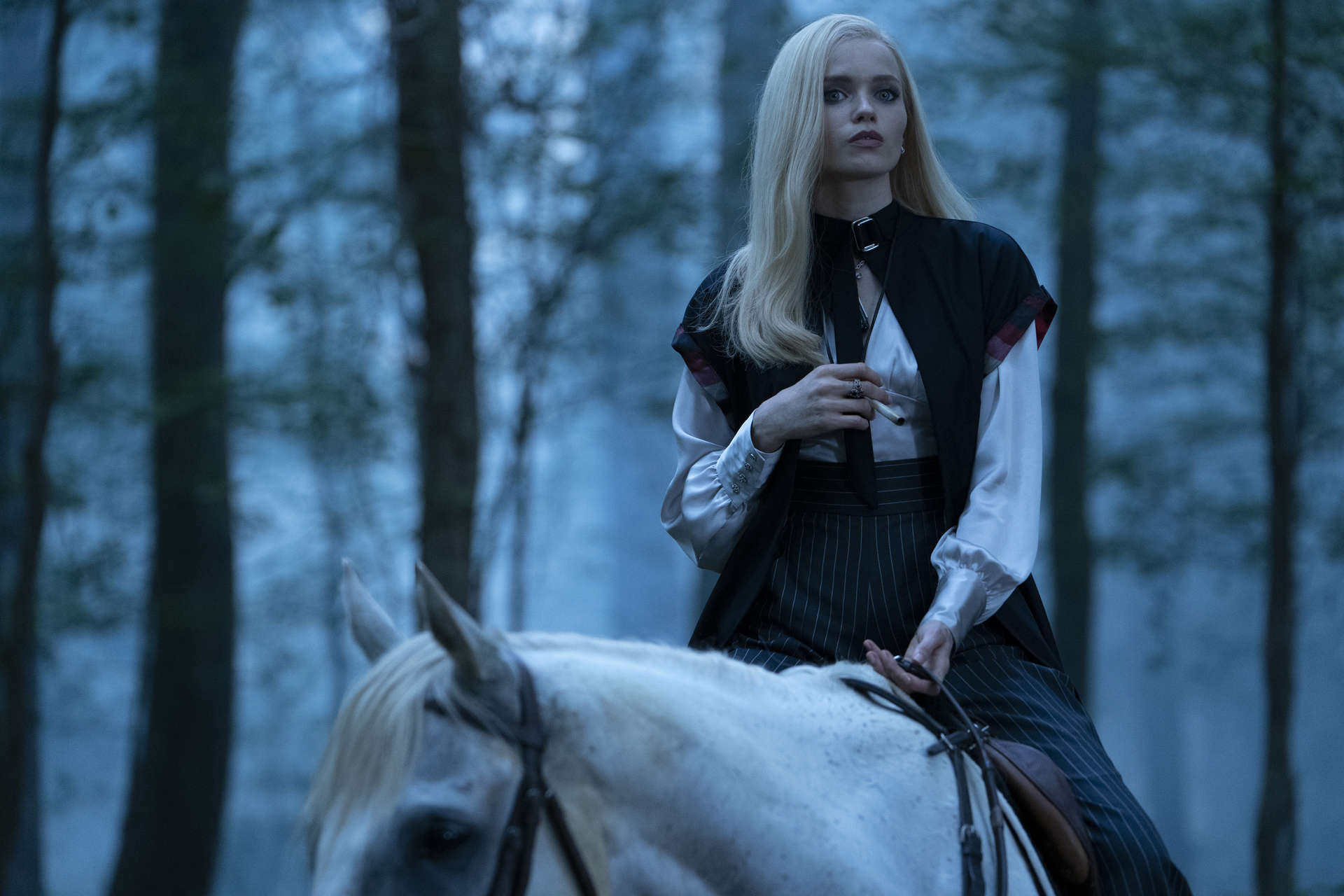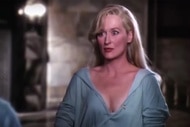Create a free profile to get unlimited access to exclusive videos, sweepstakes, and more!
Lovecraft Country and the ugly consequences of white women's complicity

How do you solve a problem like Christina Braithwhite?
That's one of the questions Lovecraft Country attempts to answer in its first season. The genre-bending series on HBO has managed to craft a surprisingly insightful bit of commentary on race relations while navigating Lovecraftian monsters and surrealist horror since its debut. But over the course of 10 episodes, it wasn't ground-dwelling vampiric parasites or nine-tailed mythological creatures or the ghosts of racists past that felt like the biggest threat to our heroes, it was white women.
The show, an adaptation of Matt Ruff's pulpy sci-fi novel of the same name, revealed one of its biggest changes from book to screen early in the season with the introduction of Christina Braithwhite (Abbey Lee), the rich white woman in the silver sedan responsible for both saving and dooming Tic and his friends — engineering their arrival at Ardham and all of the terrifying tortures that happened thereafter before following them home to Chicago. This regal, quietly menacing heiress who commands a legion of sharp-teethed creatures able to rip men in two was originally a man in Ruff's work named Caleb. Everything about Christina remains similar to her written counterpart — she's the daughter of Samuel Braithwhite (Tony Goldwyn), she possesses some kind of magical abilities, and her motivations for both helping and hurting Tic throughout the season are murky at best.
It's a seemingly innocuous adjustment, making the character a white woman instead of a man, but it's central to the grim events that eventually take place and, more importantly, the symbolism these events trade-in.
Warning: This article contains spoilers for the first season of Lovecraft Country.
You see, Christina Braithwhite is just as much of a villain as her father, as Captain Lancaster who curses Dee to be terrorized by anti-Black imagery, as the generations of white men before her happy to oppress in order to achieve — Braithwhite just cloaks her deceit and prejudice behind a veil of victimhood.
Christina, like our early suffragettes, seems outwardly progressive. She certainly doesn't make the kind of offhand comments her father does when dealing with Tic, Leti, and the rest. While her father chases a pipe dream born from his literal translation of Biblical lore — he believes an eternal Utopia that glorifies his masculinity and whiteness is within his grasp if only he can harness the spelled blood of his Black family member — Christina keeps her bigotry in the shadows. She doesn't share her father's beliefs that a Garden of Eden exists; in fact, she seems resentful of his goal to walk through a portal into that immortal realm. And why shouldn't she be? At the beginning of the season, we watch as her gender is weaponized against her.
Samuel, the physical embodiment of toxic masculinity, views his daughter's femininity as a weakness, a blight on his legacy. He commands her to perform quotations of Biblical chapters that equate women, and of course Black people, as beasts who need to be taught their rightful place by powerful men like himself. He is Adam, in charge of assigning each creature their station, ensuring the social hierarchy that places white men on top is preserved.
His vision of Utopia doesn't benefit Tic, it certainly doesn't benefit Christina, but of the two, it's Tic who recognizes this and resists it.
Christina does something entirely different. She waits. She plays the game. She uses her privilege to bide her time with varying degrees of success. Samuel eventually dies chasing his Eden, his cult is left in chaos, and Tic returns home with Leti and Montrose thinking the worst of their nightmare is over, all while Christina toys with their futures in order to achieve her own endgame.
There are moments over the course of the show's first season that seem to paint the young woman in a sympathetic light. She offers to work with Tic to find the Book of Names. She begins a romantic (and disturbing) relationship with Ruby, revealing a more vulnerable side that's jarring considering her callous ambition. She bestows a protection spell on Leti and her unborn child. She constantly fights back against the men trying to define her station in life. It's with that parallel to Tic's own suffering that it might seem like the show is drawing a thread between women's historical suffering and the Black experience. After all, both Christina and Tic are looked down upon by the white men grappling for power on this show.
But Lovecraft Country doesn't let Christina, or white women, off that easily, shattering that delusion of camaraderie by exposing how far the heiress will go for her dream of more power. She hurts people, using their flesh to parade as something she so desperately wants to be, free. She quite literally hides behind the actions of white men, posing as William, tricking Ruby into a relationship and a stint of servitude. Even when she comes to feel for Ruby, when their relationship progresses to more than a mutually beneficial transaction, Christina evades any real consequences for her actions.
In Episode 8, as Dee is being harassed by imaginary creatures, Ruby brings up the brutal beating and murder of Dee's friend, Emmett Till. Ruby questions if Christina — who's begun a romance with a Black woman — cares that a little Black boy was senselessly murdered because of the color of his skin. Christina, quite matter-of-factly, answers, "No."
It's at that moment Lovecraft Country reminds us that a white woman's hubris is a dangerous thing. It's unforgiving, capable of extreme selfishness, single-minded, and sometimes cruel. Christina may care for one Black person's life, but that doesn't mean she extends that empathy to the Black experience. It's the fictional equivalent of "Some of my best friends are Black," and it reeks of hypocrisy.
But an even more damning scene comes later, when Christina, hoping to connect with Ruby by understanding her sadness over Till's death, volunteers her own body for a beating. This violent encounter is vicious and unforgivingly filmed, but as soon as we see Christina emerge from the water unscathed we realize its true meaning. Christina, like so many white women, carries inherent invulnerability. She can be made to suffer, but she'll never suffer as badly as a boy like Emmett Till. As Ruby, or Tic, or Leti.
"Intersectionality" isn't a word they had in the '50s. It doesn't accurately describe the loaded relationship between Tic and Christina or Tic and Ruby either. But it's a word that constantly flashed through my head when watching Christina become the villain of this show, because to see Christina use gender discrimination — a very real form of oppression that's as unacceptable now as it was back then — as a shield for her prejudice and racism is to see the ugly, untold history of real-life feminist movements embodied in human form.
Christina is every woman who marched for the right to vote but stood by when that right was denied to Black women or allied themselves (under the guise of necessity) with conservative Southern women who actively participated in lynchings and mob beatings and KKK rallies. Christina is the whitewashing of history in school textbooks that frames white women's struggles as equal to or even worse than that of a Black man or woman's. Christina is even the proverbial "Karen" we see trending on social media — white women who feel entitled, who use their race and gender to villainize others, who stand with organizations and leaders actively campaigning their racist and sexist agendas because they've swallowed the Kool-Aid, because they view equality as some kind of competition and it's better to be second than to be last.
And if Christina's whiteness protects her from the same violence and prejudice that someone like Leti experiences daily, her wealth and class protect her from any self-reflection or marred reputation. At one point early in the season, she almost jokingly states that her father would never associate with the Klan because "they're too poor." She doesn't correct Tic's belief that her father (perhaps even she) is racist, or explain away his bad behavior. She simply distances herself from those she views beneath her — people committing the same kind of atrocities with the same kind of goal.
As a white woman, I understand the urge to rail at the patriarchy while ignoring other injustices. Sometimes that bitterness and rage can be all-consuming. But being a victim of prejudice doesn't give you the right to victimize others. Racism, sexism, classism, homophobia — these aren't injustices meant to be balanced on a scale and weighed against each other. We gain little from sacrificing others to appeal to some bigoted white male master in a frilly robe spouting off ideals based on stories from an old book.
None of us can truly succeed until we all succeed. That's what Christina Braithwhite reminds me of. And that's what Lovecraft Country continues to draw attention to. These inherited prejudices, these traditional systems meant to uphold them — they can all be unlearned and dismantled, but first, we've got to face our own complicity. We've got to be better than Christina Braithwhite.














